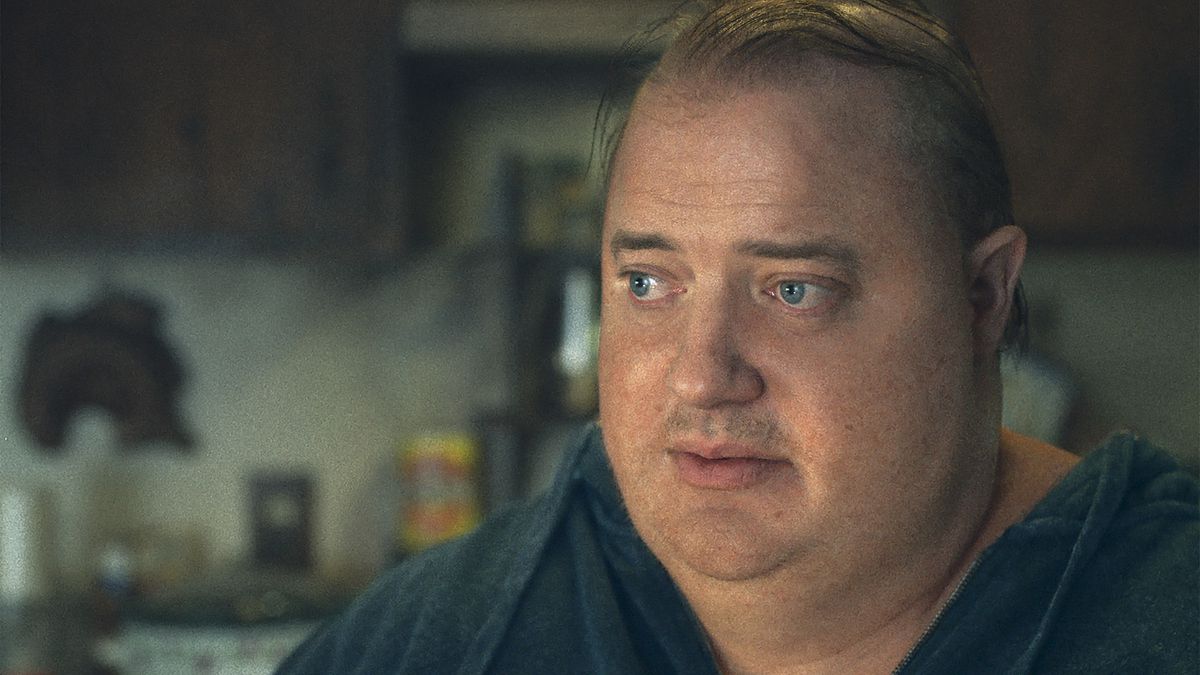The Whale drops all of Darren Aronofsky’s worst tendencies into a fat suit. It’s an exercise in abjection in the mode of Aronofsky’s torturous Requiem for a Dream, but it’s focused on an even more vulnerable target than Requiem’s addicts. It’s also full of the pet biblical wankery of Mother!, Noah, and The Fountain, but centered on a Christ figure whose masochistic superpower is to absorb the cruelty of everyone around him and store it safely inside his massive frame.
To be fair, some people enjoy this kind of miserabilism. But these viewers are also warned that not only is this film difficult to endure and likely to be actively harmful to some audiences, it’s also a self-serving reinforcement of the status quo — which is one of the most boring things a movie can be.
For a movie that, in the most generous reading possible, encourages viewers to consider that maybe there’s a painful backstory behind bodies they consider “disgusting” (the movie’s word), The Whale seems to have little interest in the point of view of its protagonist, Charlie (Brendan Fraser). Charlie is a middle-aged divorcé living in a small apartment somewhere in Idaho, where he teaches English composition classes online. Charlie never turns his camera on during lectures, because he’s fat — very fat, around 600 pounds. Charlie has trouble getting around without a walker, and he has adaptive devices like grabber sticks stashed around his house.
If an alien landed on Earth and wondered whether the human species found its largest members attractive or repellent, The Whale would clearly communicate the answer. Aronofsky turns up the foley audio whenever Charlie is eating, to emphasize the wet sound of lips smacking together. He plays ominous music under these sequences, so we know Charlie’s doing something very bad indeed. Fraser’s neck and upper lip are perpetually beaded with sweat, and his T-shirt is dirty and covered in crumbs. At one point, he takes off his shirt and slowly makes his way to his bed, sagging rolls of prosthetic fat dangling off his body as he slouches toward the camera like the rough beast he is. In case viewers still don’t get that they’re supposed to find him disgusting, he recites an essay about Moby-Dick and how a whale is “a poor big animal” with no feelings.
And that’s just what Aronofsky communicates about him through the film’s directing. The story in The Whale’s first half is a gauntlet of humiliation, beginning as an evangelical missionary named Thomas (Ty Simpkins) walks in on Charlie as he’s having a heart attack, gay porn still playing on his laptop from a pathetic attempt at masturbation. Charlie’s nurse and only friend, Liz (Hong Chau), is mostly kind to him, although she enables him with meatball subs and buckets of fried chicken. So is Thomas, although he’s less interested in Charlie as a person than as a soul to save. But Charlie’s 17-year-old daughter Ellie (Sadie Sink) openly despises him, and says the most vicious things she can think of to punish Charlie for leaving her and her mom, Mary (Samantha Morton), when Ellie was 8.
Aronofsky and writer Samuel D. Hunter (adapting his own stage play) don’t reveal the condescending point of all of this until the second half of the movie: Charlie is a saint, a Christ figure, the fat man who so loved the world that he let people in his life treat him like complete dogshit in order to absolve them of their hatred, and him of his sins. Meanwhile, a subplot involving Thomas’ past life in Iowa makes the bizarre assertion that people are actually trying to help when they treat others unkindly, which can only be true if the target of that hostility doesn’t know what’s good for them. So which is it? Should a person turn the other cheek, or be cruel to be kind? Depends on whether they’re fat, it seems. Charlie never comments on other characters’ smoking and drinking, but they sure do comment on his weight.
Perhaps the most frustrating thing about The Whale is how close it comes to some sort of insight. Aronofsky and Hunter just needed to show some empathy and curiosity about people Charlie’s size, rather than paternalistically guessing at their motivations. The main culprit here is a plot point where Charlie refuses to go to the hospital, even though his blood pressure is dangerously high and he’s showing symptoms of congestive heart failure. At first, he lies to Liz and says he doesn’t have the money to pay the massive medical bills he’d rack up as an uninsured patient. Then it emerges that Charlie has more than $100,000 tucked away in savings.
The Whale understands this as a combination of selflessness — he’s hoping to give that money to Ellie after he dies — and suicidality. What gives away Aronofsky and Hunter’s projection about Charlie’s motivations is that extensive studies have shown why obese patients avoid medical treatment, and it has nothing to do with self-sacrificing messiah-complex bullshit. Doctors are just cruel to fat people — and disproportionately likely to dismiss, demean, and misdiagnose them.
The other frustrating thing is that Brendan Fraser is actually a significant asset in the title role. He plays Charlie as a smart, funny, thoughtful man who loves language and creativity, and refuses to let the tragic circumstances of his life turn him into a cynic. He sees the best in everyone, even Ellie, whose insults he counters with affirmations and support. (She’s hurting, you see.) Fraser’s eyes are kind, and his eyebrows are furrowed with sadness and worry.
But if there’s any rage behind those eyes, we don’t see it. If Charlie is just telling people what they want to hear in hopes of minimizing their abuse, that doesn’t translate. The film seems satisfied with his surface-level protestations that he’s fine and happy and just a naturally positive guy, which again betrays its lack of interest in Charlie’s inner emotional life — Fraser’s sensitive attempt to find a man inside the symbol notwithstanding.
Aronofsky and his team are more interested in their own cleverness. Some of the barbs thrown around in Charlie’s apartment are actually pretty funny. (The movie openly shows its theatrical roots: The entire story takes place within the confines of Charlie’s apartment and front porch.) Chau in particular brings a prickly warmth to her role as Liz, the type of friend whose love language is playful insults, and whose purpose in life is as a fierce defender. Liz is hurting, too, of course; everyone is here. But while everyone is hurting, Charlie has to suffer the most for it.
If you look at The Whale as a fable, its moral is that it’s the responsibility of the abused to love and forgive their abusers. The movie thinks it’s saying, “You don’t understand; he’s fat because he’s suffering.” But it ends up saying, “You don’t understand; we have to be cruel to fat people, because we are suffering.” Aronofsky and Hunter’s biblical metaphor aside, fat people didn’t volunteer to serve as repositories for society’s rage and contempt. No one agrees to be bullied so the bully can feel better about themselves — that’s a self-serving lie bullies tell themselves. This is an externally imposed martyrdom, which negates the point of the exercise.
In The Whale, Aronofsky posits his sadism as an intellectual experiment, challenging viewers to find the humanity buried under Charlie’s thick layers of fat. That’s not as benevolent of a premise as he seems to think it is. It proceeds from the assumption that a 600-pound man is inherently unlovable. It’s like walking up to a stranger on the street and saying, “You’re an abomination, but I love you anyway,” in keeping with the strong strain of self-satisfied Christianity that the film purports to critique. Audience members get to walk away proud of themselves that they shed a few tears for this disgusting whale, while gaining no new insight into what it’s actually like to be that whale. That’s not empathy. That’s pity, buried under a thick, smothering layer of contempt.
![]()
![]()


